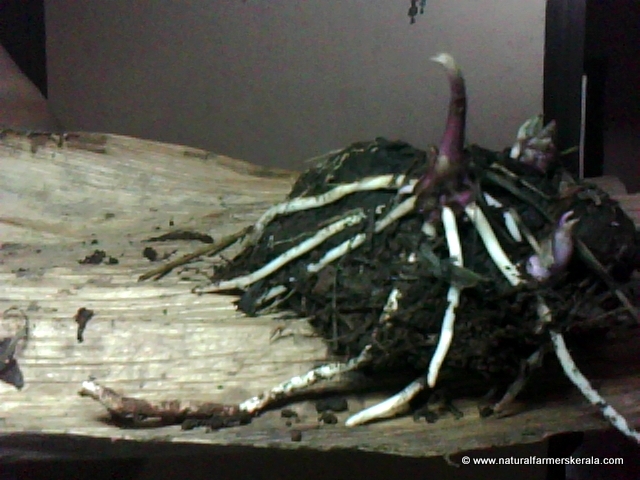World’s Biggest and Heaviest Tuber Vegetable: Food Security for the underprivileged

It’s a myth that organic farming yields less. To some extent it is correct, at least in Kerala.
Kerala is blessed with bountiful rains, so normal vegetables like tomatoes, beans, chillies, onion etc barely survive, leave aside fruiting. However one thing that grows and yields well are tubers.
Greater yams (Dioscorea alata) being one among them.In the past few decade’s various people have successfully harvested massive roots of yam, greater yam, cassava etc without the use of any chemicals.
Greater yam is known as Kaachil, Kandi Kizhangu, kaathu and Kavathu
I have personally been witness to a yield of 100 kg from one greater yam plant. Once harvested you can cut and use as required; remaining area dries out which can be shelved and used for many weeks.
Attached below is an image from newspaper cutting; 275 kg from one root which happens to be a record in Kerala.
Aren’t these types of roots, tubers the answer to world’s food security?
Now let us see how to plant, harvest and maintain greater yam. This crop cannot withstand frost and extremely high temperatures. They also require highly organic and fertile land which drains well, but requires plenty of water during growing period. Use trellis for growing, higher up it grows the bigger and better the tuber. Be careful as it may kill the tree in the process because greater yam will cover the tree canopy.

Planting of Tubers:
- Ideal time to plant is just before arrival of monsoon (Kerala its between Mar – Apr).
- Seed tubers also appear on the vine which will take time for germination. Ideal planting material is the exiting head end of the greater yam, which is the stem growing part of the root.It is generally cut and used as planting material and remaining part is consumed. You can also cut 200 to 500 grams pieces of greater yam from any part making sure there is outer skin at-least one side and soak it in cow dung slurry and let it dry. Before monsoon lay it on the ground prior to monsoon and keep watering sparingly.
- Once new shoots emerge, plant it before the onset of monsoon and water once in a week. The plant establishes and flourishes during monsoon season.
- Plant the tubers 5 to 10 cm below the ground and add lots of organic matter and cow dung.



Fertilization and Maintenance of Greater Yam:
Provide a mixture of charcoal, sand, wood ash, cow dung and coir pith to facilitate root spread.
Add more cow dung, mulch adjacent to the root spreading area which is the top layer of the soil. Roots of greater yam never travel deep underground. So a soil which has mulch throughout will yield well. Now cover the cow dung and mulch with loose soil. Also water with cow’s urine for better growth and resistance. Adding groundnut cake boosts nitrogen absorption.
Pest attack is minimal if the soil is fertile.
How and When to Harvest Greater Yam:
Harvesting greater yam is one of the difficult tasks, as in most cases there isn’t any particular pattern in which the root grows underground. It generally grows as per the soil structure. Greater yam is ready for harvest once the leaves dry out.


Seeds of greater yam hang on the vine which too is edible and can also be used as planting material.
Health Benefits of Greater Yam:
It is also considered a good vermifuge.
In folklore medicine it is also used for treatment of haemorrhoids, gonorrhoea, fever, tumours etc. Greater yam is considered good for people with hard stool. Natures best laxative.
All the above health issues are interconnected with stomach. Hence greater yam should be considered one of the best health food.







